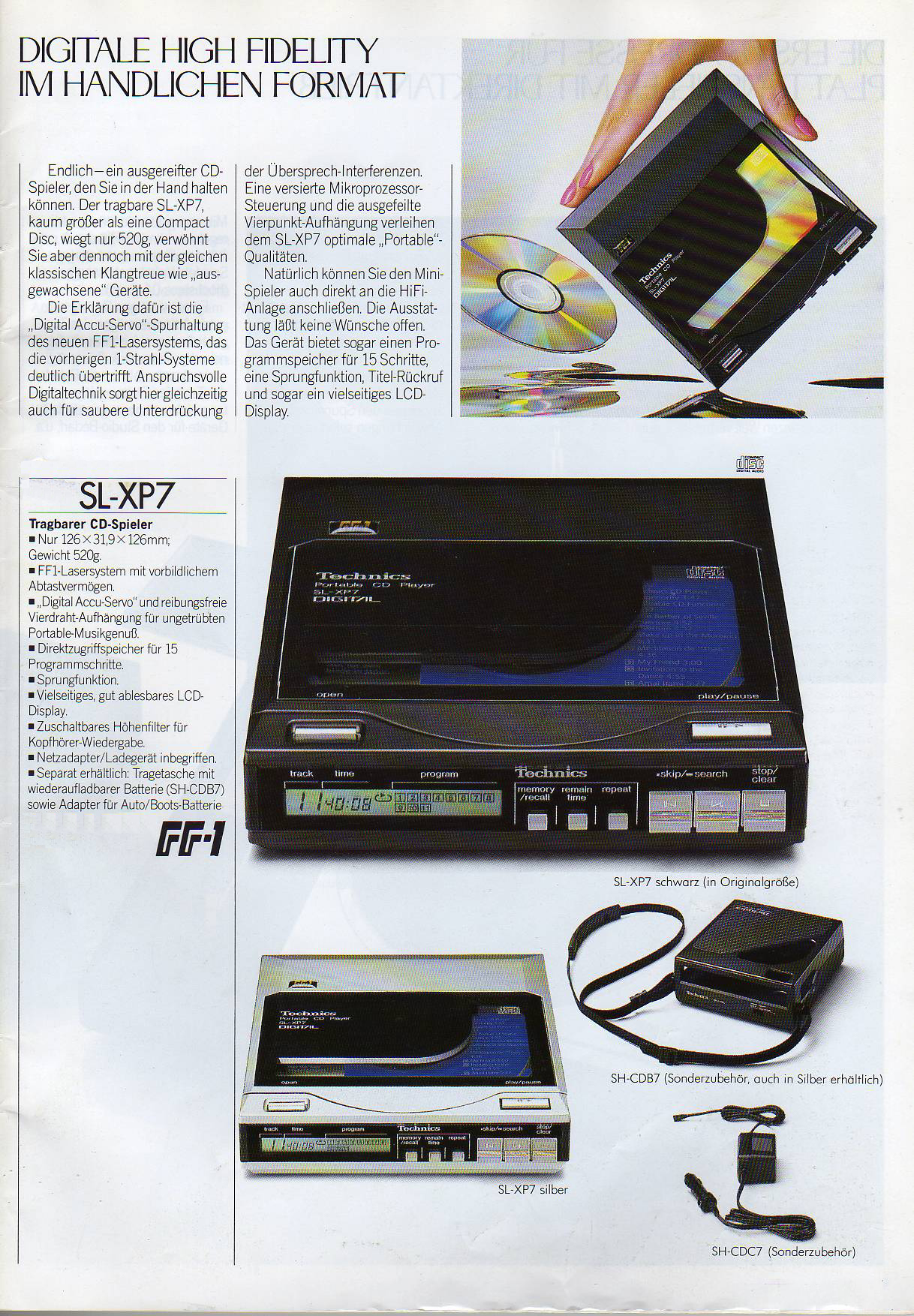Difference between revisions of "Technics SL-XP 7"
| Line 1: | Line 1: | ||
__NOTOC__ | __NOTOC__ | ||
| − | == | + | == Data == |
| − | {{ | + | {{navigation}} |
| − | ''' | + | '''General''' |
| − | * | + | * Manufacturer: [[Technics]] |
| − | * | + | * Model: SL-XP 7 |
| − | * | + | * Type: Portable CD-Player |
| − | * | + | * Years of manufacture: 1986 - 1988 |
| − | * | + | * Made in: Japan |
| − | * | + | * Color: Black, Silver |
| − | * | + | * Remote control: yes |
| − | * | + | * Power consumption: 5 W / 3.6 W (mains / battery) |
| − | * | + | * Dimensions: 126 x 31.9 x 126 mm (WxHxD) |
| − | * | + | * Weight: 520 g |
| − | * | + | * Original price approx.: 1'000 DM |
| − | ''' | + | '''Connections''' |
| − | * | + | * Number of inputs: - |
| − | * | + | * Number of outputs: |
| − | ** Line Out: 2 V ( | + | ** Line Out: 2 V (at 0 dB), 440 ohms. |
| − | ** | + | ** Headphones (6.3mm jack): 15 mW / 32 Ohm |
| − | ''' | + | '''Technical Data''' |
| − | * | + | * Sampling frequency: 44.1 kHz |
| − | * DA | + | * DA converter: 16 bit, Burr Brown PCM55HP |
| − | * | + | * Sampling laser: Technics FF-1 Single-Beam |
| − | * | + | * Wavelength: 780 nm |
| − | * | + | * Frequency response: 4 - 20'000 Hz (+0.5 / -1.0 dB) |
| − | * | + | * Dynamic range: 90 dB |
| − | + | Distortion factor: 0.004 % * Channel separation: > 90 dB | |
| − | * | + | * Channel separation: > 90 dB |
| − | ''' | + | '''Special Features''' |
| − | * | + | * Special accessories battery pack |
| + | * Special accessories 12 V car adapter | ||
| − | == | + | == Remarks == |
| − | * | + | * Other models in the same series: |
* [[Technics SL-XP 5]] | * [[Technics SL-XP 5]] | ||
* [[Technics SL-XP 7]] | * [[Technics SL-XP 7]] | ||
| Line 45: | Line 46: | ||
| − | == | + | == Pictures == |
| − | * | + | * Extract from brochure: Technics SL-XP 7 |
| − | [[ | + | [[File:Technics SL-XP 7-Prospekt-1986.jpg]] |
| − | == | + | == Reviews == |
| − | * | + | * The answer to Sony's first Discman was the SL-XP 7, a portable CD player with the FF-1 fine-focus laser system and programmable playback in 16-bit resolution. |
| − | * | + | * While Sony splits the laser beam into three partial beams and uses the two secondary beams for tracking, the Technics' single beam is directed to a photosensitive sensor divided into four squares. By shifting the beam between these squares, the deviation from the data track is detected and corrected. The sum of all four squares gives the information signal (0 or 1). The SL-XP 7, launched in 1987, is still a remarkable piece of digital technology. |
| Line 59: | Line 60: | ||
| − | [[ | + | [[Category:Portable CD Player]] |
Revision as of 02:57, 22 April 2020
Data
General
- Manufacturer: Technics
- Model: SL-XP 7
- Type: Portable CD-Player
- Years of manufacture: 1986 - 1988
- Made in: Japan
- Color: Black, Silver
- Remote control: yes
- Power consumption: 5 W / 3.6 W (mains / battery)
- Dimensions: 126 x 31.9 x 126 mm (WxHxD)
- Weight: 520 g
- Original price approx.: 1'000 DM
Connections
- Number of inputs: -
- Number of outputs:
- Line Out: 2 V (at 0 dB), 440 ohms.
- Headphones (6.3mm jack): 15 mW / 32 Ohm
Technical Data
- Sampling frequency: 44.1 kHz
- DA converter: 16 bit, Burr Brown PCM55HP
- Sampling laser: Technics FF-1 Single-Beam
- Wavelength: 780 nm
- Frequency response: 4 - 20'000 Hz (+0.5 / -1.0 dB)
- Dynamic range: 90 dB
Distortion factor: 0.004 % * Channel separation: > 90 dB
- Channel separation: > 90 dB
Special Features
- Special accessories battery pack
- Special accessories 12 V car adapter
Remarks
- Other models in the same series:
- Technics SL-XP 5
- Technics SL-XP 7
- Technics SL-XP 8
Pictures
- Extract from brochure: Technics SL-XP 7
Reviews
- The answer to Sony's first Discman was the SL-XP 7, a portable CD player with the FF-1 fine-focus laser system and programmable playback in 16-bit resolution.
- While Sony splits the laser beam into three partial beams and uses the two secondary beams for tracking, the Technics' single beam is directed to a photosensitive sensor divided into four squares. By shifting the beam between these squares, the deviation from the data track is detected and corrected. The sum of all four squares gives the information signal (0 or 1). The SL-XP 7, launched in 1987, is still a remarkable piece of digital technology.
